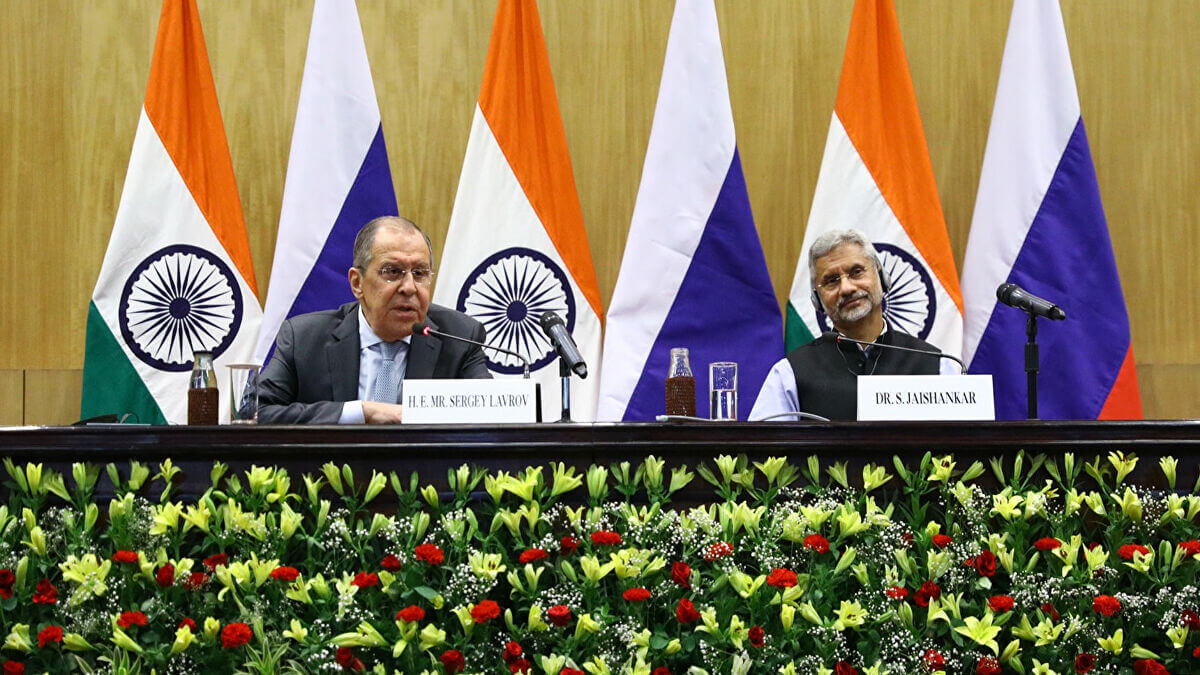Indian Minister of External Affairs S. Jaishankar met with his Russian counterpart Sergey Lavrov in New Delhi on Tuesday for extensive talks on the nations’ bilateral partnership and various areas of mutual concern. Lavrov arrived in India on Monday evening for a nearly 19-hour visit.
At a press conference following their meeting, Jaishankar said that much of their discussions focused on preparations for the upcoming summit between President Putin and Prime Minister Modi later this year. The countries have a mechanism under which their leaders meet annually to review bilateral ties, and 20 of such dialogues have taken place alternatively in India and Russia so far. The 2020 conference was postponed due to the COVID-19 pandemic.
Lavrov said that the talks between the officials were “constructive, useful, and trustworthy, as is usual in relations between Russia and India,” and expressed satisfaction that the political dialogue between the two sides had remained “dynamic” despite the pandemic. The minister said that they agreed to collectively step up efforts to boost bilateral trade and build investment cooperation under the countries’ national programs. Jaishankar added that the talks also featured discussions on the countries’ “longstanding partnership in nuclear, space and defence sectors,” UN Security Council (UNSC) issues, initiatives aimed at building connectivity, “including the International North-South Transport Corridor and the Chennai-Vladivostok Eastern Maritime Corridor,” and opportunities for pharmaceutical collaboration. When asked about whether the officials had spoken about the contentious issue of New Delhi’s acquisition of S-400 missiles, the Indian leader said that there was no specific discussion on the matter.
Agenda included UNSC issues, Afghanistan, West Asia, the Gulf, Myanmar, ASEAN and the Indo-Pacific.
— Dr. S. Jaishankar (@DrSJaishankar) April 6, 2021
Larger backdrop of global political changes provided the context. pic.twitter.com/4FN6pnrP74
The ministers also spoke about the Afghan peace process, and the role their nations could play in facilitating a long-lasting solution to the country’s civil war. Lavrov stressed that any conflict resolution efforts “must include the participation of all political, ethnic and religious groups in Afghanistan,” including the Taliban, to ensure sustainable peace. “Any other approach that leaves a particular group out of the process will not lead to a realistic and sustainable agreement, and will include the risk of renewed hostilities, which is not what the participants of the current process are trying to achieve,” he added.
Jaishankar echoed this sentiment, saying that there was a need to “harmonise” the interests of various stakeholders in and around the country. “For India, what happens in Afghanistan impacts its security directly. I shared our approach that a durable peace there would require harmonising interests of all, both within and around that country. The peace process must be based on foundational principles to which we all subscribe. And a political solution should mean an independent, sovereign, united and democratic Afghanistan,” he said.
#WATCH | "No," says Russian Foreign Minister Sergey Lavrov on being asked if Russia is planning to sign a military alliance with China pic.twitter.com/xwYgO7ErZ1
— ANI (@ANI) April 6, 2021
On the Indo-Pacific, both sides reaffirmed their commitment to preserving ASEAN’s central role in the region. In an apparent reference to China, Jaishankar said that “contemporary challenges require countries to work together in new and different ways” added that India looked to Russia as “a very important partner” as it implements its Act East and Beyond policy.
When asked about Beijing-Moscow ties, Lavrov said that though relations between the two nations were at their “highest ever” point, they were not aimed at establishing a military alliance. The Russian minister did, however, seem to take a swipe at the Quad grouping, saying that though there were rumours about an “Asian NATO,” Russia and India were in agreement that such efforts would be counterproductive. “We are interested in making our cooperation inclusive and keen for it to work towards something and not against anyone,” Lavrov added.

